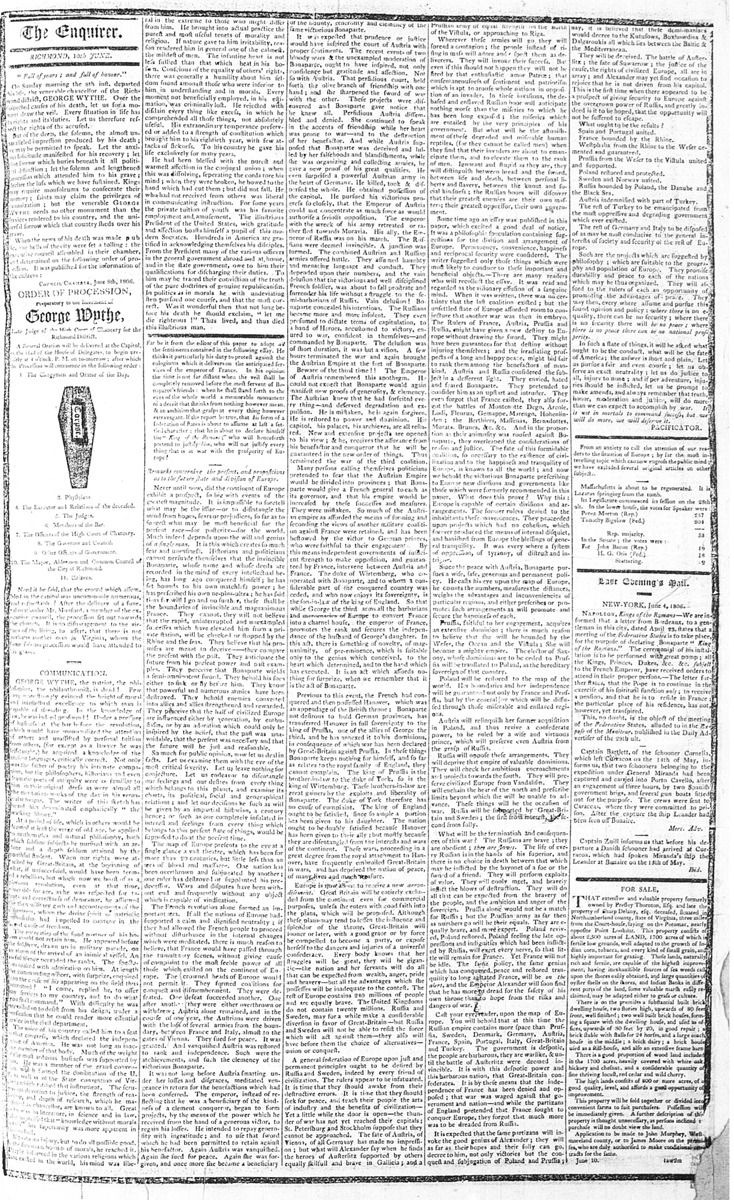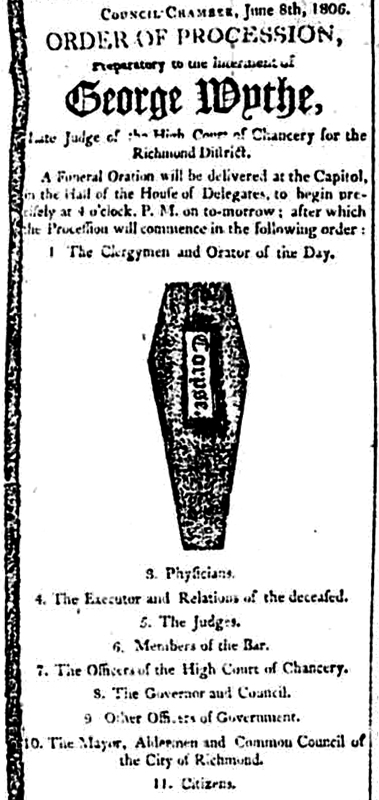Difference between revisions of "Richmond Enquirer, 10 June 1806"
| Line 10: | Line 10: | ||
==Article text, 10 June 1806== | ==Article text, 10 June 1806== | ||
===Page 3=== | ===Page 3=== | ||
| − | <blockquote><center>The Enquirer<br /><hr width="20%" />''RICHMOND'', 10''th JUNE.''<hr width="20%" /><br /> | + | <blockquote> |
| − | ''"Full of years; and full of honour."''</center> | + | <center> |
| + | The Enquirer | ||
| + | <br /> | ||
| + | <hr width="20%" /> | ||
| + | ''RICHMOND'', 10''th JUNE.'' | ||
| + | <hr width="20%" /> | ||
| + | <br /> | ||
| + | ''"Full of years; and full of honour."'' | ||
| + | </center> | ||
On Sunday morning the 8th inst., departed this life, the venerable chancellor of the Richmond district, GEORGE WYTHE. Over the suspected causes of his death, let us for a moment draw the veil. Every situation in life has its rights and its duties. Let us therefore respect the rights of the accused. | On Sunday morning the 8th inst., departed this life, the venerable chancellor of the Richmond district, GEORGE WYTHE. Over the suspected causes of his death, let us for a moment draw the veil. Every situation in life has its rights and its duties. Let us therefore respect the rights of the accused. | ||
| Line 28: | Line 36: | ||
Need it be said, that the crowd which assembled in the capital was uncommonly numerous, and respectable? After the delivery of a funeral oration by [[William Munford|Mr. Munford]], a member of the executive council, the procession set out towards the church.— It is no disparagement to the virtues of the living, to assert, that there is not perhaps another man in Virginia, whom the same solemn procession would have attended to his grave.<ref>This first section of the article is reproduced in the second edition of Wythe's Reports ([[Memoir of the Author|B.B. Minor, ed. 1852]])</ref> | Need it be said, that the crowd which assembled in the capital was uncommonly numerous, and respectable? After the delivery of a funeral oration by [[William Munford|Mr. Munford]], a member of the executive council, the procession set out towards the church.— It is no disparagement to the virtues of the living, to assert, that there is not perhaps another man in Virginia, whom the same solemn procession would have attended to his grave.<ref>This first section of the article is reproduced in the second edition of Wythe's Reports ([[Memoir of the Author|B.B. Minor, ed. 1852]])</ref> | ||
| − | <center><hr width="5%" /><br />COMMUNICATION.</center> | + | <center> |
| + | <hr width="5%" /> | ||
| + | <br /> | ||
| + | COMMUNICATION. | ||
| + | </center> | ||
GEORGE WYTHE, the patriot, the philosopher, the philanthropist, is dead! Few have more strongly evinced the height of moral and intellectual excellence to which man is capable of ascending. In the knowledge of law he was indeed profound! Under a pressure of business at the bar before the revolution, which would have monopolized the attention of others, and unassisted by personal tuition from others, (for except as a lawyer he was self-taught) he acquired a knowledge of the ancient languages critically correct. Not only was the father of poetry his intimate companion, but the philosophers, historians, and even dramatic poets of antiquity were as familiar to him in their original dress, as were almost all the meritorious works of the day in his vernacular tongue. The writer of this sketch has heard him denominated emphatically "the walking library." | GEORGE WYTHE, the patriot, the philosopher, the philanthropist, is dead! Few have more strongly evinced the height of moral and intellectual excellence to which man is capable of ascending. In the knowledge of law he was indeed profound! Under a pressure of business at the bar before the revolution, which would have monopolized the attention of others, and unassisted by personal tuition from others, (for except as a lawyer he was self-taught) he acquired a knowledge of the ancient languages critically correct. Not only was the father of poetry his intimate companion, but the philosophers, historians, and even dramatic poets of antiquity were as familiar to him in their original dress, as were almost all the meritorious works of the day in his vernacular tongue. The writer of this sketch has heard him denominated emphatically "the walking library." | ||
Revision as of 08:11, 23 June 2015
 Page three of the Richmond Enquirer for June 10, 1806. On June 10th, 1806, the Richmond Enquirer published an announcement of the death of George Wythe, with details of the order for his funeral procession, and a biographical sketch (titled "Communication").[1] This issue of the Enquirer was printed with a thick black border around its pages, as a sign of respect for the passing of Chancellor Wythe. Because the Enquirer was only published semi-weekly, on Tuesdays and Fridays, the article wasn't printed until the day after Wythe's funeral. The article was reprinted in the Evening Fire-side of Philadelphia on August 2nd, 1806.[2] Another announcement appears in the Virginia Argus, also on June 10th. Article text, 10 June 1806Page 3
References
External links |
